In opening the panel on quantum metaphysics, Dr. Jairus Grove pointed to a central theme of the Q Symposium: how both the metaphorical and technological exploitation of quantum mechanics has unleashed metaphysical effects. Artist Alexa Meade, Professor Christopher Fuchs from the University of Massachusetts at Boston, and writer John Phillip Santos from the University of Texas at San Antonio joined Dr. Grove on Sunday in a provocative discussion about the metaphysical quandaries of quantum.
Los Angeles based 3D artist Alexa Meade explained how her artworks involve painting a representation of reality onto itself, making 3D spaces appear 2D. Artist-in-residence at the Perimeter Institute for Theoretical Physics in Ontario, Canada, Meade is no stranger to the conversation of how quantum affects reality, and incorporates this element into her own work. With the subjects of her art acting as both observers and participants, Meade demonstrated how her work triggers new ways of viewing the world, taking on a superpositional quality of 3D and 2D.

(From left) Alexa Meade and Christopher Fuchs. Photo: Gilbert Bel-Bachir
Meade, a trained political scientist who worked on Barack Obama’s 2008 presidential campaign, became interested in the optical effects of shadowing, and began to experiment with 2D artistic optical effects by painting the shadows and highlights of her subject onto the subject itself. Intrigued at what she saw on the completed work, Meade abandoned her pursuit of a career in politics to teach herself how to paint through the process of this new type of illusion. She has painted on and with people, food, and their surrounding environment, and enjoys taking her 2D artworks into 3D spaces, such as the Washington, D.C. subway system in Transit (2009). Her art is unique in that the art itself and paint ‘self-destructs’, and only the photograph or video of it remains.
Her work creates a world of art that people can enter, whilst simultaneously ensuring that the subject inhabits the art itself. Her self portraits are unique in that they exist as the canvas, the creator, and the subject all at once.
Meade and her partner, Chris Hughes, also an artist, expand their work into their everyday life, turning their Los Angeles home into a ‘fun house’, playing with optical illusions in space, including self-animating illusions, mirrors, and their own currency, the ‘updn’. This coin, described by Meade as a ‘quantum coin flip’, has up and dn (down) laser cuts to ensure that whatever side the coin lands on, it is both up and down, in ‘all states, all at once’.
Moving from art to theoretical physics, Professor Christopher Fuchs explained his most recent work on Quantum Bayesianism, or QBism. Focusing on the idea of the observer as a quantum gambler, Fuchs’ described his work as the antithesis of Alexander Wendt’s.
Whereas Wendt’s work models humans as quantum systems in and of themselves, Fuchs’ examines quantum events as an outcome of humans. Despite being necessarily predicated on the existence and actions of the human agent, quantum events and states remain separate from the ‘gambling agent’.
Similarly, in an innovation over Niels Bohr’s quantum understanding, QBism extends the idea of the observer to include the tools of observation. Instead of thinking of quantum measuring devices as the eye of the observer, or ‘gambling agent’, Fuchs claims they should instead be thought of as the hands, where the agent manipulates reality to reveal the outcome. Without the gambling agent, the quantum state disappears, it being solely a function and creation of the gambling agent; QBism “doesn’t do third person”.

(From Left) Alexa Meade, Christopher Fuchs, and John Santos. Photo: Gilbert Bel-Bachir
In a controversial stance, QBism objects to the idea of quantum entanglement, recently experimentally confirmed by researchers in the Netherlands. “QBism says boo to spooky action!” Einstein worried that without locality in physics, a sneeze in a far away galaxy would influence an experiment. “Somehow”, Fuchs said, “quantum mechanics has hit a sweet spot: the world is nonlocal, and yet we can still do science – there must be something wrong with the world.” QBism instead views the world through the lens of quantum probabilities: the quantum state is what we use to gamble on reality, but not reality itself. Without gambling agents, these states and localities disappear.
In the final presentation of the panel, University of Texas-San Antonio Distinguished Scholar John Phillip Santos explored ‘Intimations of Entanglement: Prophetic Memory & Cultural Narratives in Search of a Metaphysics of the Quantum Self’. Drawing on his studies in mestizo cultural identity in South Texas, Santos exploring this theme in his book about the history of his mother’s side of the family, which he described as a ‘hallucinated memoir’, co-authored by a time travelling ancestor from the future connected to the present by DNA and radio waves; a “cultural narrative in the domain of the autobiographical”.
According to Santos, each person is a totality of 118 billion souls connected genealogically through DNA. Through this ‘quantum of the genome’, Santos explored the concept of a journey in ‘deep time’, asking “If we come from everywhere, there may be an emergent human ethic or human right to be anywhere. Not in the next one hundred, or five hundred years, but in deep time.”
Reaching deeper into the “remembrance of the before”, Santos talked about the preservation of Hispanic myth, a ‘record of quantum shifts of consciousness’, and new ways of interaction. In Santos’ view, genetics allows us to capture deep time entanglement through genealogical origins, understanding the emerging state of quantum consciousness and encounters of people through migration and transformation.

(From left) John Santos and Jairus Grove. Photo: Gilbert Bel-Bachir
Wrapping up his talk, Santos asked how we might soon be exploring new ways of being human through quantum, and how through history we are contributing to a past that we must keep alive in order for our children to have a future.
Like quantum mechanics, the study of quantum metaphysics is only in its infancy. Artists, scientists, and writers like those at Q Symposium have only begun to explore this field, but the work of Meade, Fuchs and Santos work has opened new doors of perception and opportunities of discovery.
Alex Selth is a Project Q Research Assistant and is studying for his Masters of International Security at the Centre for International Security Studies at the University of Sydney.

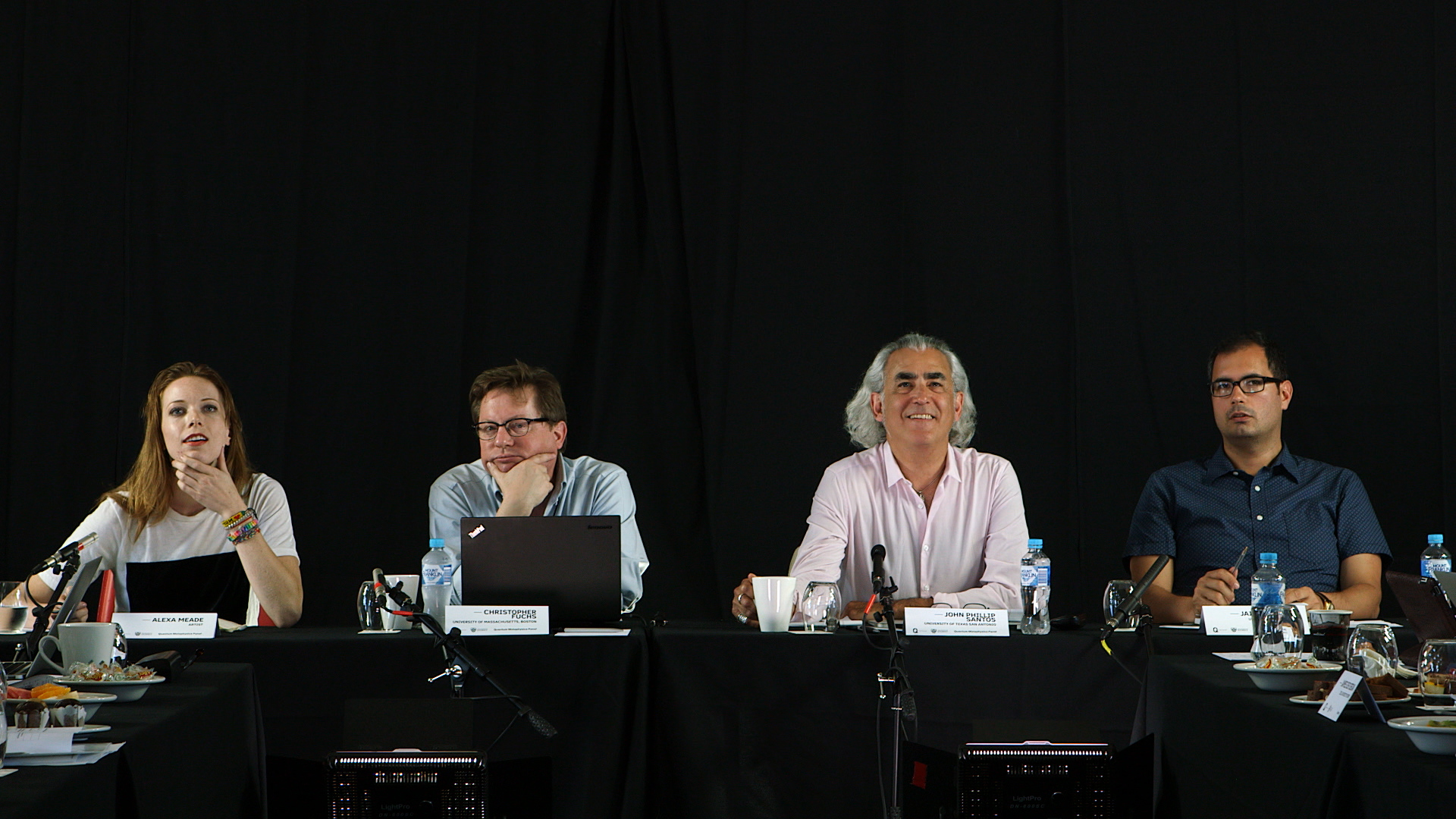
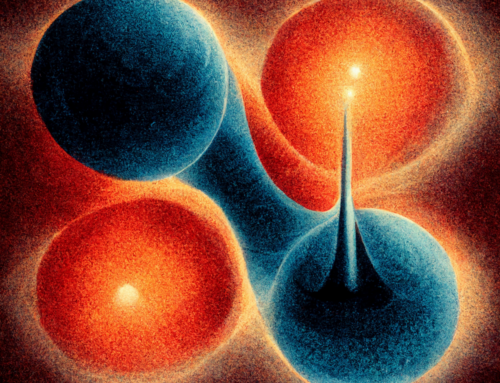
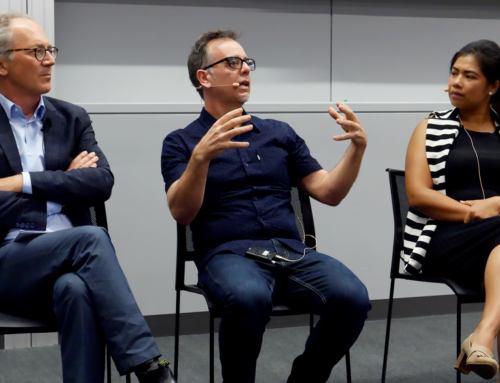
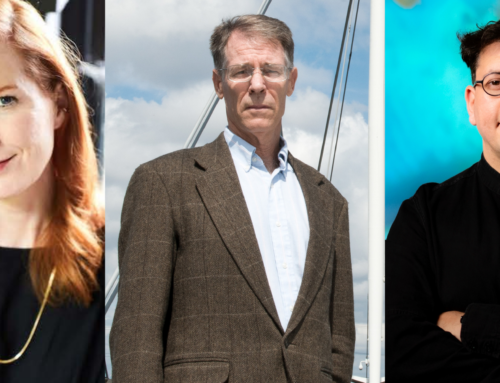
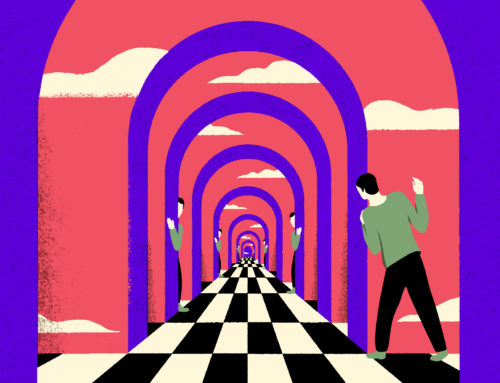
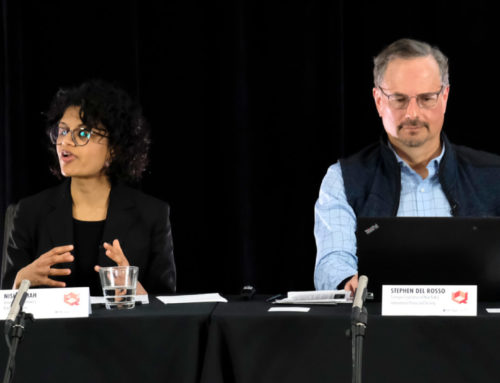
Leave a Reply